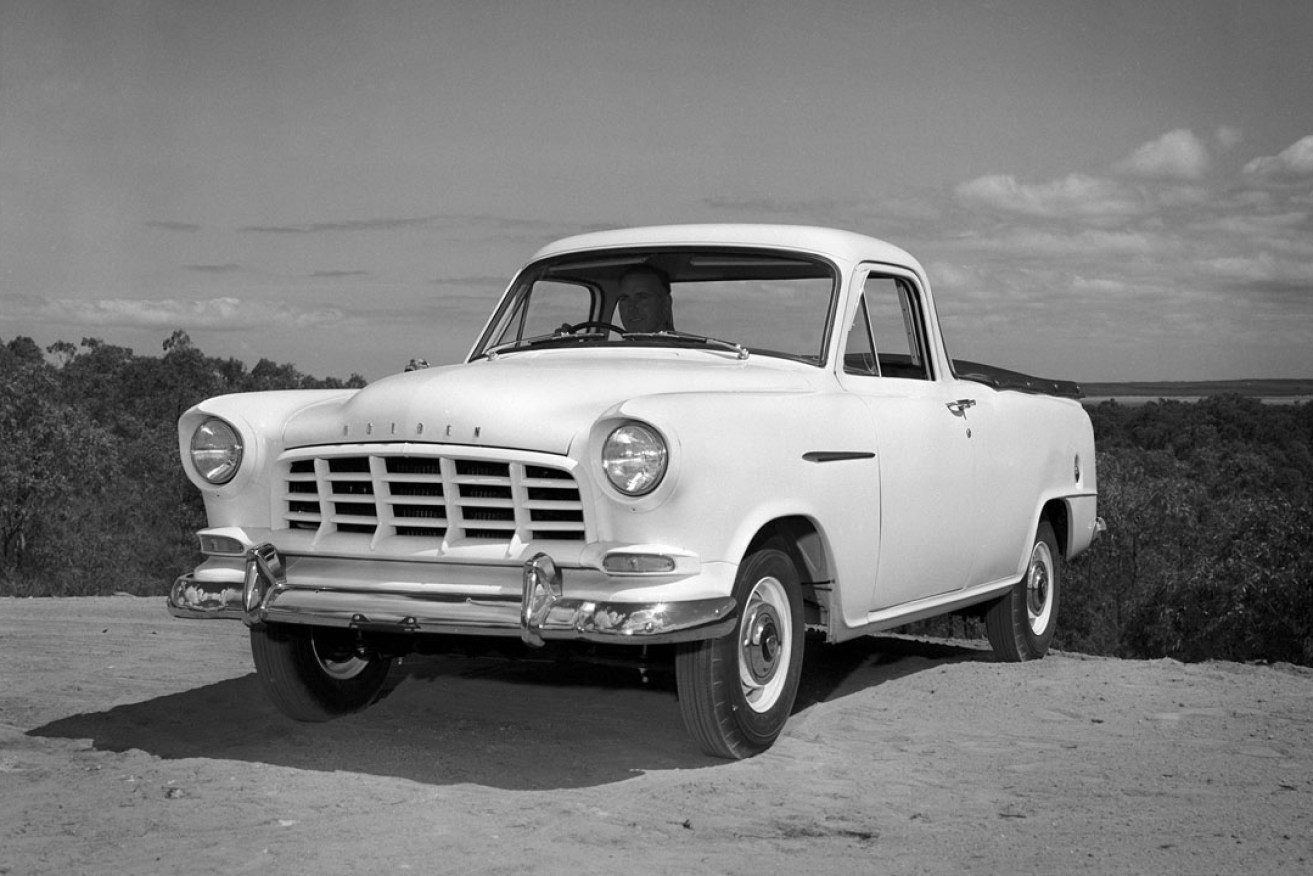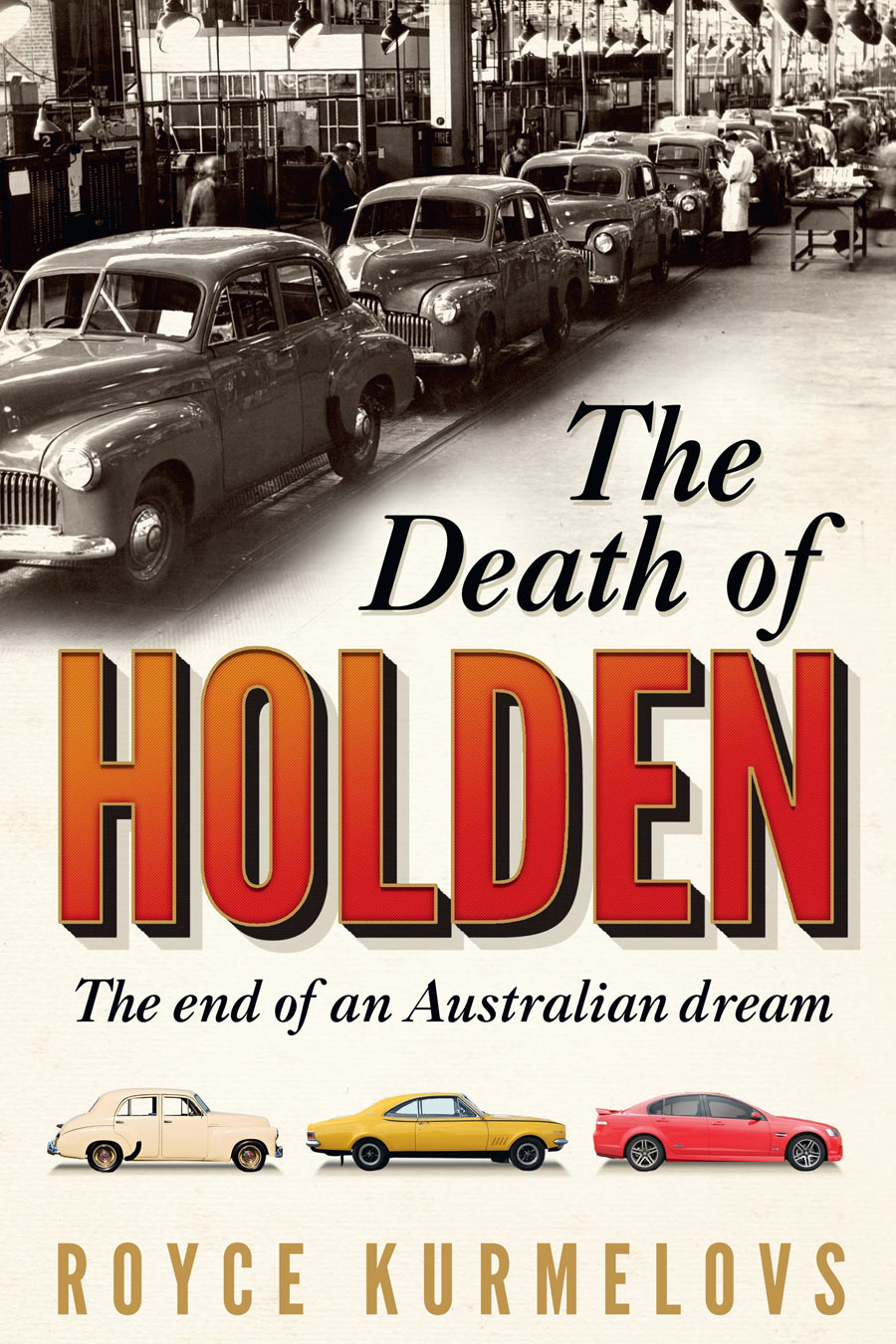Book extract: The Death of Holden
Jeff Jurgens spent more than two decades working at the Holden factory at Elizabeth until uncertainty about the future of the car industry encouraged him to take a redundancy package. But even today, seven years later, it’s as if he never left …

The Holden brand has long had an emotional grip on Australia. Photo: Holden/AAP
Adelaide author Royce Kurmelovs’ new book about the collapse of Holden, The Death of Holden: The End of An Australian Dream, is not just a story about cars. It’s also about the people who make and drive them, and the emotional connection they feel to the iconic brand.
Jeff Jurgens – whose story is shared in Chapter 10: A Good Job, below – is one of those people.
***
JEFF JURGENS WAS BORN IN THE WRONG ERA. Ten years earlier, he’d have spent his working life at the Holden plant and he’d have retired happy. Even so, he has nothing to say but good things about the company and his time with it. Sure, there were always problems, just like any other workplace, and waiting out the clock at a factory sucked some days, but that’s life. Work sucks. You’ve still got to do it.
Working in the paint shop at Holden was a good job,Jeff says, one with good people, which paid good money. It gave him everything he has, he explains, and then he lights a cigarette.
Jeff left school at 14 after the first two weeks of Year 9. He had been so sure he was leaving school, he never even bought books. All he was waiting on was approval from the school to follow his older brother up to Alice Springs so he could work with horses. Horses were the family trade, he says. His father had been a jockey, as had his uncle and his brother. Horses even brought his parents together – they met at the races where his grandfather had been a horse trainer. So when the permission came through, he left to be a jockey just like the other men of his family.
Jeff got a good few years out of it, but before long he had grown too heavy and was at a disadvantage, so he went to work on a cattle station up the Strzelecki Track where he learned how to rough it under a starry sky.
He was about 20 then and getting homesick, so after three months working on the cattle station, he moved back to Adelaide. His sister-in-law tipped him off to the fact
Holden was taking people on. It was 1988 and it was a job Jeff had promised himself he’d never do.
‘It was factory work,’ he says. ‘Procedural work. Inside. I said I would never, ever do it.’
But he did it anyway. He landed the job and the money started coming in. Like everyone else starting out, he was surprised at the size of the place. At that time the factory had ‘something like 5000 people’ running around, and the unions and so many moving parts and personalities and nationalities. Greeks. Italians. Vietnamese. Cambodians. More.
‘You take it for granted when you jump in a car and go to the shop,’ he says. ‘It’s a lot of little pieces. We built a world-class car and people took it for granted. When we see it out on the road, we take pride in what we built. When people drive our cars, we had a part in that. We built it.’
It took him a little while to get used to the rhythm. At first he resisted, but he soon picked up the line speed. Next thing he knew it was 2009 and 21 years had gone by. He had risen to leading hand, looking after a team in the paint shop, and he was taking a package. He had a family. He had kids. He had a house.
It was a tough decision to take the package and even then he waited to the very last minute to decide. Everything had been pretty uncertain around that time. Rumours had been going around even back then that the factory was going. The company had started cost cutting because of the GFC and because it wanted to get the next model, so the pressure was on to deliver. In the years before, GM had started operating factories in China and they had been bringing over guys to be trained at Elizabeth. Those training them knew in their gut they were probably training the people who would eventually take their jobs. Still, Jeff had turned down the previous two offers and this time around he struggled with the choice: stay, or go.
‘I thought I was going to work there forever,’ he says. ‘We had bought a house close to my employment when we had a young family. Nicole was two and Luke wasn’t born yet. Everything we have is basically because of Holden.’
Even when pushed, he doesn’t offer one clear reason why he took the package that fateful day in 2009. All he says is that there were many reasons and there was a feeling it was as good a time as any to take the money and step down.
There is a tendency among some to talk about the end of the car industry as a ‘liberating’ experience. The thrust seems to be that money paid to prop up the factories was being ‘liberated’ for use elsewhere, like the $4 billion the federal government shifted from subsidising automotive manufacturing to subsidising the agricultural sector in July 2015. The people who work the line would also be ‘liberated’ to do something else with their life, the thought seemed to run. When this kind of talk starts, the whole shutdown gets painted as a favour to the couple of thousand men and women who would be out of a job in 2017.
Only, people like Jeff never asked to be liberated from the factory. Never asked to be turned out to scrape together a living in the service industry. It may seem like a quaint, old-world notion to those who talk of car factories as the dark, dingy places of the past and joke about how they were living off taxpayers’ money, but those like Jeff who worked in the factory took pride in what they did. They were men and women of substance. They woke up each morning, slid into their car and went into work where they did their jobs. Every day, without question. They earned their living, took care of their families as best they could and contributed to something bigger than themselves. At the end of the day, they had something to show for their labour. The plant was their place and there they mattered.
‘It becomes a way of life,’ Jeff says. ‘Every morning, you get up and go to work. That’s the way it was.’
Even after he was liberated from factory life, Jeff would still follow the same familiar rhythm. He’d wake up at five every morning, because that’s what he’d always done. Only, in those early months he had nowhere to go. At that time, the company helped him get into a three-month course doing a certificate in Transport, Warehousing and Logistics. Out of that, he got an MR truck licence, which can cost a couple of thousand dollars. Even then, it didn’t make life easier for Jeff, who went out into a job market very different from the one he knew over two decades ago.
‘I was off for a year and I had three months doing that course and the rest looking for a job,’ he says. ‘Even with that certificate, it was very hard because I had no experience. I applied for at least four or five jobs every day and, 98 per cent of the time, you don’t hear back from them. Hundreds and hundreds of jobs and I only got two interviews.’
That was five years ago and since then the job market has only got harder, Jeff says. Though the global financial crisis had just hit when he left, Australia managed to survive the worst of it. The mining boom hadn’t hit its peak yet and there were jobs to be found. Eventually Jeff did find work driving trucks, but it took longer than expected and by then the money from the package was running out.
Five years on, he has managed to get himself into another manufacturing job on contract, painting and blasting the warships with the Australian Submarine Corporation (ASC) down at Osborne. It’s well paid, earned after a period of struggle, but still the ‘valley of death’ – where a gap between projects meant a drop-off in work – started to hit the shipbuilding industries and people were being laid off. Jeff was made redundant for four months, but was called back on contract as a cleaner on the ships. He was more than fine with it, he says. He’s getting older now and it was easier than what he had been doing before. It also meant a regular pay cheque.
Even today, Jeff is still in the factory. When he talks about his time with Holden, he uses the present tense. It’s as if he never left. Like he’s still one of the guys, even though he doesn’t see anyone from the plant much anymore. Sometimes they cross paths while they’re out and when they do, they’ll sit down somewhere, get a beer or a coffee and shoot the shit for a while. Remember what it was like. But mostly, the people he saw every day for 21 years have dissolved from his life, except for his cousin who still works at the plant. His cousin’s getting on now and Jeff worries what he’s going to do when the place closes, just like he worries about all the others. He knows what it meant to work for Holden and he knows what the end of it will mean for his people, good people who built the cars everyone else took for granted.
It was those people he thought about when he heard over the radio the place was closing. He had been driving a truck that day and for him the news was huge. There had been rumours for a while, sure, but he never thought there would actually come a time when Australia didn’t make cars. Jeff didn’t need 50 pages of economic modelling to know what it meant. All he needed were those few wayward years on the open job market.
‘It’s the small businesses,’ he says. ‘The local shop. The local pub. The footy clubs. You have to pay fees for your kids to play sport. Can they afford it? I don’t know.’
He lights another cigarette.
‘You know, in ten years’ time, when things get hard for those families and their children, people are going to say, “I told you so.”’
From The Death of Holden: The End of an Australian Dream, by Royce Kurmelovs, published this month by Hachette Australia, $32.99. Extract republished with permission.





